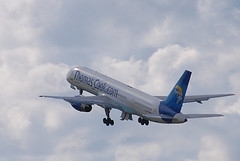 Air travel can be exhausting. We all know that and, in the past, we’ve written about jet lag and ways to try to prevent it. But that exhausted feeling you feel when you land – or when you’re in the air – might actually be mountain sickness.
Air travel can be exhausting. We all know that and, in the past, we’ve written about jet lag and ways to try to prevent it. But that exhausted feeling you feel when you land – or when you’re in the air – might actually be mountain sickness.
Mountain sickness – or altitude sickness – occurs most often in mountain climbers and skiers who vacation at high elevation. But it can impact air travelers as well. It’s a matter of cabin pressure, and how well your body deals with it.
Here’s the science (I’ll keep this quick): A transoceanic flight typically will reach an altitude of between 35,000 and 40,000 feet (the Concorde used to fly at 60,000 feet); consider that Mt. Everest is just a shade over 29,000 feet. However, obviously, the airplane’s cabin pressure doesn’t reflect that extreme altitude; most commercial airliners are pressurized to somewhere between 5,400 and 7,000 feet (kind of like being in Denver). Scientists say that most healthy adults can handle that, but the upper edge of that range can begin to cause some discomfort.
A study a couple of years ago in the New England Journal of Medicine simulated the effects of a 20-hour flight at barometric pressures corresponding at up to 8,000 feet above sea level. The study showed that blood oxygen levels dip as you get close to 8,000 feet of cabin pressure – and that can lead to headaches, fatigue and aches, and cramping.
That means that overcoming these symptoms might not just be a matter of adjusting sleep patterns as you move across multiple time zones. Here are some simple tips on how to combat mountains sickness when you’re traveling:
- Stay hydrated. That means drinking plenty of liquids, and not drinking too much alcohol.
- Get some rest, and stay warm – grab an extra blanket.
- If you’re really struggling (not likely, but certainly possible), ask the flight crew if they can provide supplemental oxygen. For a full list of which airlines will provide it, check the Airline Oxygen Council of America.
- Eat carbs! This is probably more applicable if you’re spending a week in the Himalayas, but I’m taking every opportunity to wolf down some carbs if someone gives me the go-ahead. And it might ease the symptoms too.
- If you’ve had a bout of mountain sickness before, you might want to talk to your doctor before your flight to see if she will prescribe acetazolamide (Diamox), which prevents acute altitude sickness.
Photo by puddy_uk.









